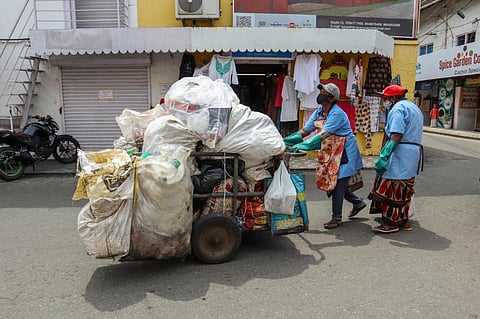

Municipal bye-laws have all the elements to be the game changer for attaining sustainable solid waste management for the cities. It is a legal tool at the disposal of the local government, which, if implemented properly, can help achieve sustainable waste management mandates like home composting, source segregation of waste, prevention of littering, burning or open dumping of waste.
The municipal bye-laws can also ensure on-time regular door-to-door collection, efficient treatment and processing of waste, redesigning the concessionaire agreement to shift from tonnage-based to segregated collection-transportation-treatment-based systems. They can guarantee safe transport and disposal of non-reactive, combustible, non-biodegradable, inert waste to landfills instead of being dumped as mixed waste.
Municipal bye-laws can be instrumental in collecting revenue through user charges on waste collection from individual and institutional users. The authorities can also levy fines to individuals or institutes for non-compliance of provisions mentioned in them. The bye-laws can also be used as a medium to incentivise desired waste behaviours like segregation at source, handing over segregated waste to the municipal authorities or in-situ management of organic wastes by the bulk waste generators in the cities.
The municipal bye-laws for solid waste management are a regulatory framework encompassing all aspects of Solid Waste Management right from its generation to final disposal, as well as penalising the violators. Consequently, they can penetrate every household or commercial setting for monitoring.
The bye-laws derived from the Solid Waste Management Rules, 2016 are in line with the Municipal Corporation Act of any urban local body (ULB).
Municipal bye-laws can be of many types, find its root from state corporation acts
The Solid Waste Management Rules, 2016 mandates all local authorities, village panchayats, census towns and urban agglomerations to frame bye-laws, incorporating the provisions of the current rules within one year from the date of notification of these rules and ensuring timely implementation.
It also necessitates that these local entities make / amend a bye-law for solid waste management to be able to provide necessary services to the citizens smoothly, levy taxes or fines and collect user fees whenever and wherever deemed necessary.
India is a federal republic with three spheres of governance: Central, state and local.
The 73rd and 74th amendments to the Indian Constitution gave recognition and protection to the local governments and a right to every local government to have their own legislature. Through the 73rd Amendment in 1992, the rural self-government was formalised through the Panchayati Raj System; with the 74th amendment, also brought in 1992, the democratically elected local self-governments were named “municipalities”, and they were given the power to set up in urban areas.
It was only the 74th Constitutional Amendment Act (CAA) in 1992 (came into force on June 1, 1993) that brought constitutional validity to the municipal or local governments. And they derived their power from the individual state government.
CAA added a 12th Schedule, which provided eighteen lists of functions that are to be the responsibilities of the local self-governments. The introduction of this Act has subsequently increased the participation of people in the governance and the Act has also added uniformity in the legislation for the various government bodies at the urban level.
Other obligatory services of a municipal corporation include health, drinking water, building improvement, urban planning, poverty alleviation, slum development and sanitation, which is one of the biggest issues to be addressed by them.
Making or amending existing municipal bye-laws thus become a mandatory duty for the municipal bodies by the virtue of the mandates from Solid Waste Management Rules, 2016, and modifying it based on the local requirements is again a liberty to the local self-governments resulting from the 74th CAA.
These bye-laws must be passed by a majority vote of the municipal council. A draft of the bye-laws are put up in various public places for at least 30 days, after which, amendments and changes if any, should be incorporated into the main bye-laws and notified.
A municipal bye-law on solid waste management typically has two major components:
|
Duties of waste generators |
Obligatory Duties of local government |
|
|
In order to assess the efficacy of municipal bye-laws for improved waste governance, Delhi-based think tank Centre for Science and Environment has completed a study covering 37 cities across 17 states and six Union territories from different zones of India. The study inspected the municipal bye-laws as legal documents, in pursuit of understanding their relevance in accordance with the current policy space that governs solid waste management in India. Following this, their state of implementation was evaluated on two counts: What the cities claimed to have achieved versus what the citizens validated in the name of municipal solid waste management
An excerpt of the study was published in this story.